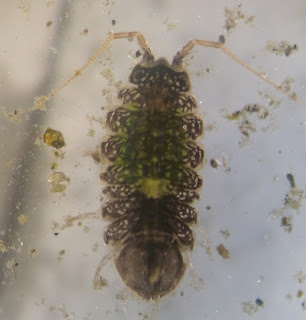After browsing "Marine Fauna" I was flabbergasted at how many ubiquitous/frequent/common species I am supposedly missing and so I determined I was going to get at least one or two of them! So it was that I scored a new mollusc yesterday with the massive Onoba semicostata. This entailed picking up every rock and peering over my specs until I found
Your browser settings may determine how many times life size this appears. They are 2x1 mm typically, and indeed mine were. There are a number of other such snails, and tiny crabs (and tiny everything). With so many of our fauna being very small I'm slowly adjusting to the fact that making my scan image much smaller is an important field skill. As is grilling every square mm of substrate.
I had a Jaera before but "Fish & Fish" wasn't particularly helpful. When I realised the Fauna had much more info I braved it and found that taking into account characters, habitat and distribution I could be fairly confident that these are Jaera albifrons.
Tricky situation today. From yesterday's tide I know that it will be very low at lunchtime today. It's also sunny. I need clones to catch flies and flip rocks. With a bit of luck I'll find flies on rocks, though I'll need several nets. I look more and more like Inspector Gadget.
Numbers:
| 479 | * | alga | Cladophora rupestris | A marine alga |
| 480 | * | cnidarian | Clytia hemisphaerica | A hydroid |
| 481 | alga | Polysiphonia fucoides | A seaweed | |
| 482 | lichen | Collemopsidium foveolatum | A lichen | |
| 483 | mollusc | Littorina obtusata | Flat Periwinkle | |
| 484 | * | cnidarian | Phialella quadrata | A hydroid |
| 485 | * | mollusc | Onoba semicostata | A marine snail |
| 486 | * | crustacean | Jaera albifrons | A marine isopod |



Nearly 500 species before the middle of March is stunning. With no sea within my 1 km square (and only with access to 5% of the square) I am biding my time. If it's a good moth year could get 450 species in the garden, but a grand total of 8 so far...
ReplyDeleteI'm shooting for 175 moths spp. - 450 is outrageous! The highest targetted groups I have are fungi, diptera, flowering plants and moths, but none are over 200. Biggest group I had last year was 171, which was plants.
DeleteI see you're working your way through the Linyphiids. Better bring Roberts up to Skye then! Although we should probably major on things that need less microscope time
DeleteI will be bringing a microscope but suspect that we'll not have much time to look through it. I would like to use it to pin specimens if possible - don't really like leaving diptera in alcohol or acetic acid too long, would rather get them dry and on a pin. Hope it's sunny as would like to put down some yellow traps if poss, good for flies, hymenoptera etc.
DeleteI've never really done diptera in depth before last year, but am now getting into it fairly seriously (except some of the difficult groups such as phorids, fungus gnats etc). Saw 219 species of diptera in the garden last year but would hope to see 300 (or more?) this year. Perhaps 200 species of beetle, 100 hymenopetra, 80 spiders, 100 birds, 80 hemiptera?
DeleteThat's a roaring start on diptera then. I think we may need to have some indoor sessions for a break and to do "show and tell" on what we've found
DeleteI've had fun with Jaera before. Had to check the hindlegs of a male, or somesuch I seem to recall. By sheer coincidence, I threw one back yesterday.
ReplyDeleteThat would have been ideal, but a few species are distinctly southern or have specific habitat requirements so you can reduce the domain you're working with substantially. The females seem to have some characters to those legs which are similar to the males' so it would be interesting to see females of several species.
Delete